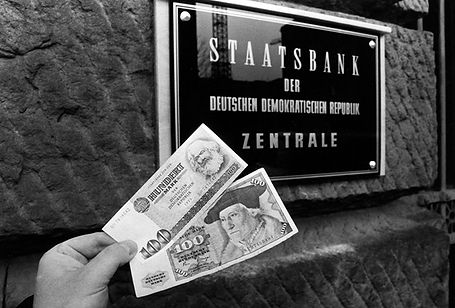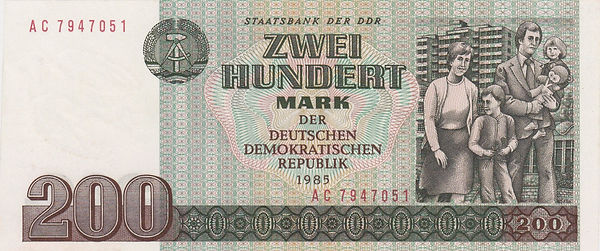


Pay and Remuneration for
Members of the NVA
Information from “The East German Army” The Second Power in the Warsaw Pact by Thomas M. Forster – Pay and Welfare - pages 297 to 300


All NVA men on conscript service received monthly pay according to rank. The figures given below should be compared with the average employee’s income in the DDR in 1977 of 839 East German Marks (Mark der DDR) per month, including such “social income” items as family allowances and net of income tax and social security contributions. The skilled workers salary then ranged between 800 and 900 Marks. (Basic consumer goods are, of course, cheaper in the DDR, so far as they are available.)
Estimated Pay rates in 1977 - Nationale Volksarmee and other paramilitary organizations by Service Grade
Soldat/Matrose 120 Marks
Gefreiter/Obermatrose 150 Marks
Stabsgefreiter/ Stabsmatrose 180 Marks
Unteroffizier/Maat 190 Marks
Unterfeldwebel/Obermaat 200 Marks
Feldwebel/Meister 210 Marks
Oberfeldwebel/Obermeister 220 Marks
Stabsfeldwebel/Stabsobermeister 230 Marks
Fahnrich 240 Marks
Unterleutnant 220 Marks
Leutnant 240 Marks
Oberleutnant 260 Marks
Hauptmann/Kapitanleutnant 300 Marks
Major/Korvettenkapitan 340 Marks
Oberstleutnant/Fregattenkapitan 360 Marks
Oberst/Kapitan zur See 390 Marks
On the top of basic pay, performance bonuses can be granted when earned, also Erschwerniszuschläge (difficulty supplements) in consideration of specially onerous physical or psychological work conditions. Both pay and bonuses are exempt from income tax or social security payments.
Short service privates and NCOs and regular NCOs and officers on active service receive service emoluments (Dienstbezüge - remuneration), related to terms of service, rank, function and seniority; the same applies to servicewomen. Supplementary amounts, including hardship awards can be added. Short-service NCOs performing the functions of regular NCOs or officers can have their emoluments made up to the same level. In contrast to army pay, these emoluments are liable to income tax and social security deductions.
Short-service soldiers in private and equivalent ranks (e.g. seamen in mobile units, and anti-parachutist personnel) receive the same pay as conscripts during the first 18 months. Thereafter they receive rank-relates emoluments, as well a once-only “transition payment” of 1500 Marks.
Examples of total monthly remuneration for given ranks:
Unteroffizier/Maat 300 Marks
Fahnrich 450 Marks
Leutnant 600 Marks
Hauptmann/Kapitanleutnant 700 Marks
Major/Korvettenkapitan 750 Marks
Oberst/Kapitan zur See 900 Marks
Generalmajor/Konteradmiral 1100 Marks
Armeegeneral 3100 Marks
Examples of total monthly remuneration for given functions:
Section Leader (Unteroffizier to Oberfeldwebel) 125 to 450 Marks
Company Leader (Oberleutnant to Major) 525 to 625 Marks
Company Commander’s Political Deputy 525 to 575 Marks
Battalion Commander 700 to 850 Marks
SED or FDJ Secretary, Battalion 650 Marks
Regimental Commander 1100 Marks
Divisional Commander 2000 Marks
Political Deputy to Head of Military District 2000 Marks
Head of Military District 3000 Marks

Seniority increases are based on rank and function, and progress from 5 percent after 5 years’ service to 20 percent after 20 years.
Officer Cadets receive a gross monthly remuneration of 300 Marks in their first year of training, up to 500 Marks in their fourth.
Bonuses for good performance and exemplary behavior in the fulfillment of duty can be awarded both to individuals and collectives.
Married short-service and regular NCOs and married regular officers, receive a housing allowance in lieu of barrack maintenance. Single men or women can also claim this if they have children and run a household.
Servicemen who feed themselves outside barracks receive a meal allowance. This applies to married soldiers provided they satisfy the army that they can eat regularly outside without prejudice to their duties. Men on leave also receive meal allowances for the period in question.
Removal costs are payable to married regular NCOs and officers who move house under orders, or with approval, to their place of service or very near to it.
Men conscripted into the reserve service receive normal pay and retain their claim to their civilian jobs. They receive a compensatory sum throughout from their place of work.
The extent of damage liability born by servicemen is determined by the Compensation Order (Wiedergutmachungsverordnung - Redress Regulation). Damage is defines as occurring when the NVA or Grenztruppen incur material or financial loss through culpable action. Any person act culpably who deliberately, wantonly or negligently violates his service obligations and caused damage thereby. A soldier, for example, who leaves his unit without permission has to bear the whole cost incurred to bring him back. Anyone causing damage under the influence of alcohol has to pay for it. The amount of compensation and manner of payment are decided by his commander.
Under the Promotion Order (Förderungsverordnung – Promotion Regulation) civil employment does not lapse when a man is called up for basic service; it is merely in abeyance. Enterprises are under obligation to keep in maximum contact with “their own soldiers” and their families. Soldier’s releases from active service have to be given priority in re-employment by their old enterprises, even if they are temporarily unfit for work. If they apply for new jobs minimum qualifications have to be accepted. The same applies to university and college entrance for short-service privates, NCOs and officers.
Regular ex-servicemen are entitled to a job with a salary equivalent to what they received in the army. There is a list of parallels between NVA certificates and vocational titles and equivalent civilian qualifications.
In general, it would be fair to say that the national economy has to beat a large share of the NVAs welfare obligations.
There is a Maintenance Order (Unterhaltsverordnung - Maintenance Regulation) which prescribes the maintenance sums payable to conscripts’ dependents. Maintenance is payable to a wife, if:
-
She is unfit for work and has no other income
-
There is at least one child under 16 in the household
-
She is released from work during pregnancy or after childbirth
-
She is attending school or a full-time study course
-
She is an invalid, or has charge in her household of a member of the family in need of constant care
-
If none of these circumstances apply, she receives 100 Marks for herself and 60 Marks for each child.
Conscripts are also entitles to other forms of financial assistance, e.g. adjustment of installment payments, and rent assistance. In the case of debts incurred before call-up to state and cooperative credit banks, state-owned enterprises and other agencies total or partial respite of payment may be granted.